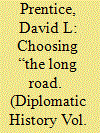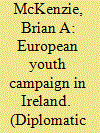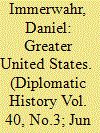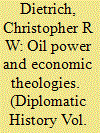|
|
|
Sort Order |
|
|
|
Items / Page
|
|
|
|
|
|
|
| Srl | Item |
| 1 |
ID:
145538


|
|
|
|
|
| Summary/Abstract |
This article examines the domestic politics of President Jimmy Carter’s 1978 “package” sale of advanced warplanes to Egypt, Israel and Saudi Arabia. Based on newly available documents from the Carter Presidential Library, the Israel State Archives, private collections, and media and public opinion material, it argues that Carter was so eager to demonstrate he had the strength to overcome domestic opposition to pursue his international agenda that the means used to gain support for the package virtually eclipsed the end itself. The White House based its decision to pursue the sales on strategic imperatives. However, the tactics employed to push the package through Congress stemmed as much from Carter’s political imperatives as from the need to meet the Saudis’ request. The episode underscored the reflexive nature of Carter’s domestic political standing and his Arab-Israeli policy, with his position in one serving to reinforce the other.
|
|
|
|
|
|
|
|
|
|
|
|
|
|
|
|
| 2 |
ID:
145537


|
|
|
|
|
| Summary/Abstract |
Focused on Richard Nixon, Henry Kissinger, and the Paris negotiations, scholars have overlooked Melvin Laird’s role as secretary of defense though his Vietnamization ended America’s presence in the ground war. I argue that Laird was Vietnamization’s architect and that in 1969 he proved critical in the formation of Nixon’s Vietnam strategy. That year, Nixon and Kissinger devised an elaborate plan to threaten and then launch a bombing campaign against North Vietnam to compel its capitulation. Laird contended the domestic front would not tolerate such a mad scheme. Instead, he developed what became America’s exit strategy, Vietnamization—the strategy of improving South Vietnamese military capabilities while withdrawing U.S. troops. Through Laird’s efforts, Vietnamization replaced Kissinger’s strategy to halt troop withdrawals and use unrelenting military force against North Vietnam. By the end of 1969, Nixon sided with Laird, hoping that Vietnamization could win the war at home and abroad.
|
|
|
|
|
|
|
|
|
|
|
|
|
|
|
|
| 3 |
ID:
145536


|
|
|
|
|
| Summary/Abstract |
The European Youth Campaign was a youth group covertly funded by the Central Intelligence Agency to promote European unification and security arrangements. It was created in response to the Soviet sponsored 1951 World Festival of Youth and Students held in Berlin. The Irish branch, which was active until 1958, offers a useful case study to examine the intersection of international Cold War politics and domestic concerns about youth deviance and the impact of American mass culture. Irish organizers hosted conferences and engaged in a broad publicity campaign. The European Youth Campaign also illustrates aspects of Americanization. Irish delegates stressed the contribution Ireland could make to the moral rearmament of Europe while at the same time debating the impact of productivity and materialism on Irish society. This study thus expands our understanding of Irish-European integration debates and shows how a small, neutral country participated in the cultural Cold War.
|
|
|
|
|
|
|
|
|
|
|
|
|
|
|
|
| 4 |
ID:
145534


|
|
|
|
|
| Summary/Abstract |
March 1954 is a month diplomatic historians know well. It was when the Viet Minh attacked the French air base at Dien Bien Phu, which ultimately pulled the United States into the Vietnam War. But we speak less of another anticolonial revolt that broke out in another part of the world. Two weeks before Dien Bien Phu, four nationalists entered the House of Representatives in Washington, D.C., made their way to the upstairs Ladies’ Gallery, unfurled a Puerto Rican flag, pulled out pistols, and fired 29 rounds into the body politic below them. They shot five Congressmen, nearly killing one.
|
|
|
|
|
|
|
|
|
|
|
|
|
|
|
|
| 5 |
ID:
145535


|
|
|
|
|
| Summary/Abstract |
This article examines William Faulkner’s travels as goodwill ambassador for the State Department between 1954 and 1961, focusing on how the nationalist priorities and racial politics of U.S. foreign relations during the cold war shaped the context for his trips as well as his own proclamations while abroad.
|
|
|
|
|
|
|
|
|
|
|
|
|
|
|
|
| 6 |
ID:
145539


|
|
|
|
|
| Summary/Abstract |
This article holds that Henry Kissinger conducted a free market diplomacy in result to the 1974-1974 energy crisis. That is, he and other decision-makers in the Department of the Treasury, the National Security Council, and the State Department demonized the Organization of Petroleum Exporting Countries as an illiberal bogeyman and made the parallel argument that the free market was the only rational system capable of meeting global economic challenges. The culmination of this policy was the decision in the Ford Administration to subvert the egalitarian and redistributionist arguments of the United Nations’ 1974 Declaration of a New International Economic Order. Kissinger and other policymakers did so through a diplomacy of accommodation, a policy towards Third World demands for a more just international economy that continued into the Carter Administration.
|
|
|
|
|
|
|
|
|
|
|
|
|
|
|
|
| 7 |
ID:
145540


|
|
|
|
|
| Summary/Abstract |
Speaker of the House Tip O’Neill’s decision to oppose U.S.-Nicaragua policy based on Maryknoll nuns’ advice led Ronald Reagan and his supporters to question O’Neill’s authenticity as a Catholic and his masculinity. Catholics and non-Catholics argued that true Catholics backed U.S. policy because, as they incorrectly asserted, the pope did. While 25 years earlier presidential candidate John F. Kennedy faced questions about his primary loyalty as a Catholic, Reagan and his allies promoted the stereotype that Catholics should fall in line behind the pope. Likewise, the Maryknoll Sisters were bad nuns for failing to obey male Church leaders who supported the contras. The response to the O’Neill-Maryknoll connection revealed how intra-Catholic conflict influenced U.S. policy, challenging scholars’ stress on evangelical Protestants’ influence on Reagan and on inter-religious conflict during the Cold War.
|
|
|
|
|
|
|
|
|
|
|
|
|
|
|
|
|
|
|
|
|